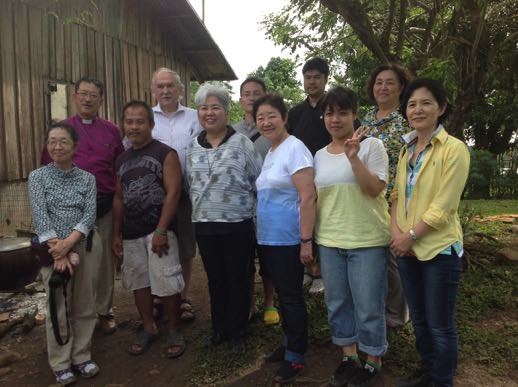2015 Work Camp
28/02/15 20:45 Filed in: Partnership Work Camp | Partnership
The 2015 Work Camp in the Philippines is now under way. All the campers arrived safely on Friday and were warmly welcomed by our friends in the Episcopal Diocese of Central Philippines. There are four campers from Kobe Diocese, three from Kyushu and two from Okinawa, including one member of the clergy from each diocese. They will be working in two groups, one at Banlic and one at Jamboree Agape Episcopal Church, both under the pastoral care of Joe Medina.
Happy New Year 2015
31/12/14 19:30 Filed in: Partnership New Year
Happy New Year!
Many of the churches in Kyushu have services on New Year’s Day, usually a little later than the usual Sunday services. Not all of the churches can do this because of the shortage of clergy, but those with a resident pastor will normally have such a service, even if it is not specifically indicated on the page for the church.
Many of the churches in Kyushu have services on New Year’s Day, usually a little later than the usual Sunday services. Not all of the churches can do this because of the shortage of clergy, but those with a resident pastor will normally have such a service, even if it is not specifically indicated on the page for the church.
Advent Tour
06/12/14 22:06 Filed in: Partnership Partnership
Members of various churches in Kyushu, together with Bishop Luke, Rev. Osada of Kobe Diocese and Rev. Iwasa of Okinawa Diocese, took part in this year’s Advent Tour to the Philippines (December 1st to 4th). We visited Sta. Ines and Banlic as well as EDCP offices in Quezon City, and enjoyed meeting many old and new friends. The fellowship and hospitality, and the extensive preparation especially by Rev Joe Medina (Akay), was much appreciated. The photo, taken by Rev. Echanes Cadiogan, shows all members of our group with one of the Banlic congregation at his home.


Readings
Although the Anglican churches around the world tend to follow a similar pattern in their liturgy, new translations and developments in recent times mean that there are more differences nowadays.
For example, whereas many churches in Japan now use the Mikotoba no Reihai (Service of the Word) instead of Morning Prayer when a Communion service is not possible, thereby following all three readings from the Communion service, many churches in England now have only one or two readings in the Communion service instead of three, at least in some of their services.
Possible readings at the service I attended here in England yesterday were Isaiah 51: 1-6, Romans 12: 1-8, and Matthew 16: 13-20, but only Romans and Matthew were actually read. At Holy Communion services and Service of the Word in Japan, the reading from Romans was from chapter 11, verses 33-36, but the readings from Isaiah and Matthew were the same.
For example, whereas many churches in Japan now use the Mikotoba no Reihai (Service of the Word) instead of Morning Prayer when a Communion service is not possible, thereby following all three readings from the Communion service, many churches in England now have only one or two readings in the Communion service instead of three, at least in some of their services.
Possible readings at the service I attended here in England yesterday were Isaiah 51: 1-6, Romans 12: 1-8, and Matthew 16: 13-20, but only Romans and Matthew were actually read. At Holy Communion services and Service of the Word in Japan, the reading from Romans was from chapter 11, verses 33-36, but the readings from Isaiah and Matthew were the same.
Biblical Verses
Since my grasp of Japanese is far from adequate, i often refer to my English bible (usually NIV) during the readings and the sermon, and quite often during the collective reading of a psalm. This can be awkward, however, when the versification of the Japanese text differs from the English.
In yesterday’s Holy Communion service, for example, we were reading Psalm 69, verses 1-17 (Japanese), with Rev. Yoshioka reading the odd-numbered verses and the congregation responding with even numbered ones.
As I was trying to respond quietly in English, I soon found myself out of sync with everyone else. When I checked the psalm in both languages after the service, i found that verses two and three in Japanese correspond to verse two alone in English. Thus, verses 1-17 in Japanese correspond to verses 1-16 in English. The second English verse is follows:
I sink in the miry depths, where there is no foothold. (J2)
I have come into the deep waters; the floods engulf me. (J3)
For anyone trying to follow the service using English, therefore, it would be necessary to say only the first part of verse two, allow the president to finish the verse, and thereafter read the odd-numbered verses, with the president finishing on verse 16 (17 in Japanese).
In yesterday’s Holy Communion service, for example, we were reading Psalm 69, verses 1-17 (Japanese), with Rev. Yoshioka reading the odd-numbered verses and the congregation responding with even numbered ones.
As I was trying to respond quietly in English, I soon found myself out of sync with everyone else. When I checked the psalm in both languages after the service, i found that verses two and three in Japanese correspond to verse two alone in English. Thus, verses 1-17 in Japanese correspond to verses 1-16 in English. The second English verse is follows:
I sink in the miry depths, where there is no foothold. (J2)
I have come into the deep waters; the floods engulf me. (J3)
For anyone trying to follow the service using English, therefore, it would be necessary to say only the first part of verse two, allow the president to finish the verse, and thereafter read the odd-numbered verses, with the president finishing on verse 16 (17 in Japanese).


